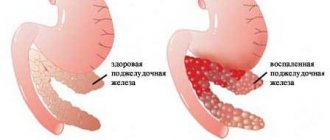A panic attack is an acute attack of anxiety and unreasonable fear, accompanied by vegetative symptoms. Chest pain, severe weakness, rapid heartbeat, shortness of breath, and muscle tremors may occur. During pregnancy, panic attacks appear against the background of nervous tension, physical overload, and exacerbation of chronic pathology. Their effect on the fetus is minimal, complications rarely occur. Treatment focuses on psychotherapy. Sedatives and other medications are prescribed according to indications.
Panic attack - what is it?
Some experts consider uncontrollable panic attacks to be one of the manifestations of vegetative-vascular dystonia. Others believe that it is an independent disorder. Still others see them as a consequence of stress.
All doctors' opinions ultimately come down to one thing: panic attacks are a malfunction of the autonomic nervous system, manifested by sudden anxiety, fear and accompanying physical symptoms. In a word – a vegetative crisis or exacerbation of VSD.
A panic attack, like other dystonic disorders, is not a somatic disorder. This is rather a consequence of emotional instability and the result of a functional mental disorder (not related to mental illness). That is, PA and VSD cannot be considered a disease.
The disorder predominantly affects young people aged 18 to 45 years. Women suffer from PA and VSD more often than men.
Feelings of anxiety and horror that come during an attack, as a rule, do not have a clear basis: the so-called fear of fear arises, the person does not want to experience this state again and is afraid of a repetition of the attack.
Such panic attacks are especially severe during pregnancy. After all, the woman is already worried about her new situation and worries about the baby’s health. And here you also have to worry about your health.
Against the background of panic attacks, women often develop hypochondria - a reversible mental disorder, expressed in a constant search for various diseases.
Pregnancy is a psychologically difficult period in the life of any woman, especially if it is her first. Panic attacks during pregnancy can occur in a previously absolutely healthy woman only because she cannot cope with the worries and worries associated with the health of the unborn baby, and with the responsibility that falls on her from now on.
How to prevent a recurrence of an attack
Experiencing one panic attack is already a serious test for the health of the nervous system. Faced with this disorder for the first time, women begin to look for methods that will prevent a recurrence of the attack.
The simplest, most effective and at the same time complex method of prevention is not to be nervous and not to worry. Emotional calm and stability guarantee the absence of groundless fear and panic. This can be achieved in several ways:
- moderate physical activity;
- long walks in the fresh air;
- normalization of the daily routine;
- proper nutrition;
- breathing exercises.
While pregnant, many doctors advise attending yoga classes for pregnant women. Such training helps relieve tension in the nervous system, relieve back pain and improve mood. Physical activity is minimal, all attention is paid to proper breathing, which helps to fully relax and calm down. Such training will better prepare you for childbirth, strengthen the necessary muscle groups and make you forget about panic attacks for a long time.
Long walks in the fresh air have a positive effect on the entire body as a whole, and on the nervous system in particular. It is recommended to walk more, especially before going to bed. A daily half-hour walk in the evening will quickly get rid of insomnia and make your night's sleep truly sound and healthy. Of course, here you need to know when to stop - in severe frost, it is better for a pregnant woman not to overuse walks.
Symptoms of panic attacks during pregnancy
The symptoms of PA attacks in pregnant women are no different from the symptoms in people in a normal state.
The severity of symptoms, their number and other characteristics depend on the specific individual: general health, type of nervous system, mental state, character traits.
The most common symptoms of panic attacks during pregnancy are:
- Lack of air, chest pressure, shortness of breath.
- Dizziness.
- Tachycardia (rapid heartbeat).
- Pain in the heart, chest.
- Darkening in the eyes, spots, blurred vision.
- Numbness of the limbs.
- Weakness in legs, arms.
- Trembling in the body, feeling of goosebumps.
- Increased sweating.
- Chills or, conversely, a flush of heat.
- Pain in the body, muscles.
- Changes in blood pressure.
- Noise, ringing in the ears.
- Compression of the temples.
- Tingling, muscle twitching.
- Nausea (rarely vomiting).
- Gastrointestinal disorder.
- Frequent urination.
- General weakness, malaise.
- Unreasonable fear, anxiety, strong fear of death.
The average duration of an attack is 15-25 minutes. PA can be mild or very severe. After an attack, increased fatigue, instability of mood and self-control, and sleep disturbances usually appear. A person does not have the strength for an intellectual or physical robot.
Sometimes panic attacks in pregnant women occur without a feeling of fear. But a suffering woman experiences depression, apathy, a feeling of melancholy, or, conversely, irritation that develops into aggression. Some develop agoraphobia (fear of open spaces). With agoraphobia, people cannot be in a store, the subway, leave the house, or be alone. It is a frequent companion of VSD and panic disorders.
Symptoms
Autonomic disorder is characterized by feelings of severe anxiety and fear that arise for no reason. These sensations are accompanied by unpleasant somatic manifestations. Most often, panic in pregnant women is manifested by the following symptoms:
- hypo- or hyperthermia;
- heavy sweating;
- dizziness;
- instability while walking;
- extremely unpleasant sensations in the stomach, nausea or vomiting, abnormal bowel movements;
- dry mouth;
- feeling of lack of air and other breathing problems, such as shortness of breath;
- tachycardia, unstable blood pressure, heart rhythm disturbances;
- before childbirth, muscle cramps in the legs and arms are possible.
You should consult a psychotherapist if at least 4 of the above symptoms occur against a background of incomprehensible fear.
Causes of panic attacks in pregnant women
There are many factors that provoke the development of panic attacks during pregnancy.
The most common reasons include:
- Anxious and suspicious personality type. Such people are impressionable, emotional, they exhibit excessive anxiety and self-doubt.
- Previous strokes, tumors and brain injuries.
- Diseases of the reproductive system, thyroid gland, adrenal glands (endocrine system as a whole).
- Various psycho-emotional tensions, stress, neuroses, psychological trauma, physical and mental stress.
- Chronic lack of sleep.
- Lack of certain vitamins and elements in the body.
- Hereditary predisposition.
- Hormonal changes during adolescence, the establishment of the menstrual cycle, pregnancy, menopause.
If a woman did not previously have PA, but during pregnancy they suddenly appeared, the reason most likely lies in pathologies of the endocrine system. Diseases of the thyroid gland or adrenal glands are often asymptomatic. But it is the endocrine system that produces all the main hormones responsible for the regulation of the autonomic system.
During pregnancy, many women experience hypothyroidism (thyroid deficiency). With this disease, the adrenal glands produce increased amounts of adrenaline. Adrenaline surges provoke panic attacks.
Therefore, in case of PA, it is necessary to undergo a thorough medical examination and pay special attention to the organs of the endocrine system.
Panic attacks and VSD crises during pregnancy - is there a danger?
During pregnancy, the situation is complicated by the fact that a woman usually becomes more suspicious and anxious, listening to her condition and constantly assessing the potential danger around her. Against this background, attacks of PA may become more frequent and severe.
Sometimes during pregnancy, a woman experiences attacks of anxiety or fear for the first time, and this situation is doubly unpleasant for her: in addition to the painful sensations, there is a logical fear for the health of the unborn child.
During this period, many women experience frequent mood swings. This contributes to an increase in the number of different phobias and fears, which can provoke the appearance of PA. The greatest fear that most expectant mothers have is the loss of a child. It is capable of transformation into various forms at different stages of pregnancy: fear of miscarriage or frozen pregnancy (1st trimester). Then it can transform into fear of interruption for medical reasons (2nd trimester). Fear of premature birth (3rd trimester).
Online appointment with a doctor in any city in Russia
Next comes fear for the child’s condition. A woman experiences anxiety so that her illness or condition does not affect the child’s health in the future.
In third place are worries about whether the expectant mother will be able to provide the child with everything she needs, and fear for the future of this child.
Interesting facts about pregnancy:
Fact 1
Tuesday is a popular day for children to be born. Scientists studied the dynamics of child birth and found that most children are born on Tuesday. The fewest children are born on Saturday or Sunday.
Fact 2
Do you know why more than 90% of all babies are born with blue eyes? All this is explained by the fact that at the time of birth, children lack melanin, which accumulates in the iris of the eyes only from six months.
Fact 3
The child begins to show emotions even in the womb - laugh, cry, be sad. Moreover, the crying of a child in the womb is not always caused by the mental state of the baby; it is simply in this way that the baby prepares himself for the difficult process of childbirth.
Treatment and prevention
It is worth understanding that drug therapy during pregnancy is contraindicated. All medications pose a danger to the fetus, so their use should be avoided before pregnancy. In particularly severe cases, mild antipsychotics may be prescribed.
The main direction of treatment is psychotherapy for panic attacks . The main task is to eliminate the cause that caused the panic. Self-help and anxiety reduction training is currently being provided to pregnant women. These techniques can increase a person’s overall resistance to stress and eliminate the likelihood of panic attacks.
They are used along with breathing practices, acupuncture, herbal medicine, art therapy, and aromatherapy sessions. These non-drug methods have proven effective in combating this problem.
Proper prevention is of no small importance. If a woman is faced with the problem of PA, she needs to remember the following points.
- Stress and PA have not only psychological, but also physiological effects on the mother’s body, so it is important to learn how to deal with stress in order to avoid its vegetative manifestations.
- Increasing stress resistance and relaxation are the only safe ways to get rid of the negative impact of attacks; medications pose a danger during this period.
- You can relieve tension and prevent the occurrence of PA by maintaining a daily routine, proper healthy eating and physical activity. You should get rid of bad habits even before pregnancy.
The main thing in this important period for a woman is to find more reasons for joy. Many worries are simply not justified; it is important to discuss this with your psychologist in order to be able to avoid overreacting to some points in the future. You can fight sad thoughts and anxieties with the help of hobbies, reading good books, watching interesting good films.
Panic attacks during pregnancy - impact on the fetus
Panic attacks and pregnancy are not mutually exclusive. These manifestations cannot be considered a direct contraindication to conception and childbirth, since they are not dangerous in themselves.
But attacks can complicate the course of pregnancy, since the condition of the mother directly affects the condition of the fetus. For example, a sharp drop in blood pressure is manifested by a lack of oxygen in the blood, and the release of stress hormones leads to muscle overstrain. Hypertonicity of the uterus, which inevitably occurs with muscle tension, in severe cases increases the risk of miscarriage.
A child in the womb always feels the state of its mother. Scientists have proven that a neurotic type of character can begin to form during the period of fetal development. The mother passes on her neurotic reactions, behaviors and reflexes to the child.
Therefore, although panic attacks are not a serious threat to a child’s health, there is still a negative impact.
Doctor's opinion
Elena Kim, obstetrician-gynecologist:
“I have met patients suffering from panic attacks. If the disorder is not caused by a disease, it is possible to correct the psycho-emotional state of the pregnant woman with the help of psychotherapy, which I always recommend to such women. I resort to medications last.
In diseases such as hypothyroidism, attacks usually stop on their own after appropriate treatment. It is very important to carefully diagnose the patient and detect the cause of panic attacks in time.
Pregnancy in such women occurs differently. It all depends on the general level of health, age, number of births. But in most cases, pregnancy proceeds well and the child is born healthy.”
Valerian for panic attacks and VSD, how to take
What to do if you have panic attacks during pregnancy
There is no cure for panic attacks; they are not treated with medication. To get rid of PA, it is necessary to influence the cause, and not the effect, which are crises. There are medications that relieve panic attacks, but many of them are contraindicated during pregnancy.
Any medications, even the most harmless ones, should be prescribed by a doctor to a woman expecting a baby.
Relaxing techniques will help you get rid of panic attacks on your own or reduce the frequency of their occurrence.
Breathing exercises from PA for pregnant women
A panic attack changes the physiology of the body through the psyche. If the patient is unable to cope with his body, his muscles tense, his heart rate fluctuates, and his breathing is interrupted. This entails an even more pronounced attack of fear. In this case, the main goal for stopping an attack is to equalize breathing, which, in turn, will help to relax the body.
When choking, attempts to breathe often only aggravate the situation and increase tension. Accordingly, in order to relax, you need to focus on exhaling. The essence of relaxation breathing exercises is to increase the time allotted for exhalation.
To control the time, conditionally divide the breathing process into 3 phases: inhalation, pause and exhalation. Start with five seconds inhaling, four seconds pausing, and five seconds exhaling.
In each new cycle, subtract one second from the pause and add one second as you exhale. After 4 cycles, the duration of exhalation will reach 10 seconds. Breathe in this rhythm for a couple of minutes, and you yourself will feel how the tension goes away and the attack subsides.
Autogenic training and meditation give good results. If desired, any woman can master these techniques. Meditation is very useful during pregnancy and is an excellent remedy for panic attacks.
This is also interesting:
How dangerous is VSD to life and what outcome can it lead to?
Breathing exercises
Breathing exercises promote:
- stress relief;
- relaxation of all muscles;
- normalization of the nervous system;
- improving sleep quality.
You can master this technique on your own, but it is better to attend several classes where, under the supervision of a specialist, everyone will be taught how to perform the exercises correctly.
The effectiveness of yoga is based on breathing exercises. These exercises will help you avoid lack of oxygen, which is so important during pregnancy, when many women suddenly experience shortness of breath.
When an attack approaches, many people only need to do a few breathing exercises to gain control over their own emotions and thereby quickly get rid of the attack. For panic attacks during pregnancy, breathing exercises are the only effective method that does not harm the health of the child.
Planning pregnancy during panic attacks
VSD and PA are not a contraindication to pregnancy. But a woman with such disorders needs to plan conception in advance by completing a rehabilitation course and following the doctor’s instructions.
Doctors recommend completely stopping taking psychotropic medications at least 2 months before conception. Taking psychotropic drugs during pregnancy in the first trimester is strictly prohibited.
In the second and third trimesters, they can be prescribed only in critical cases: if the benefits to the mother outweigh the risks to the fetus (that is, only in situations where the mother develops too severe a mental disorder, and medications cannot be avoided).
Tranquilizers, antidepressants and some sedatives used during pregnancy can put the fetus at risk of developing various birth defects. Under no circumstances should they be taken on their own.
When planning a pregnancy, it is recommended to undergo a course of drug treatment in advance. Even before conception, it will be useful to use non-drug methods (psychotherapy, breathing practices, relaxation techniques) and adherence to a certain regime.
Specialists who provide assistance with panic attacks: psychiatrist, psychotherapist (sometimes psychologist), neurologist. A psychiatrist mainly provides only medication assistance to the patient, so it is better to entrust panic attacks in pregnant women to a psychotherapist (after all, the choice of medications approved for pregnant women is very small).
If pregnancy is planned in advance, you have time to gently and gradually stop taking medications and switch completely to non-drug safe means of self-help and rehabilitation.











